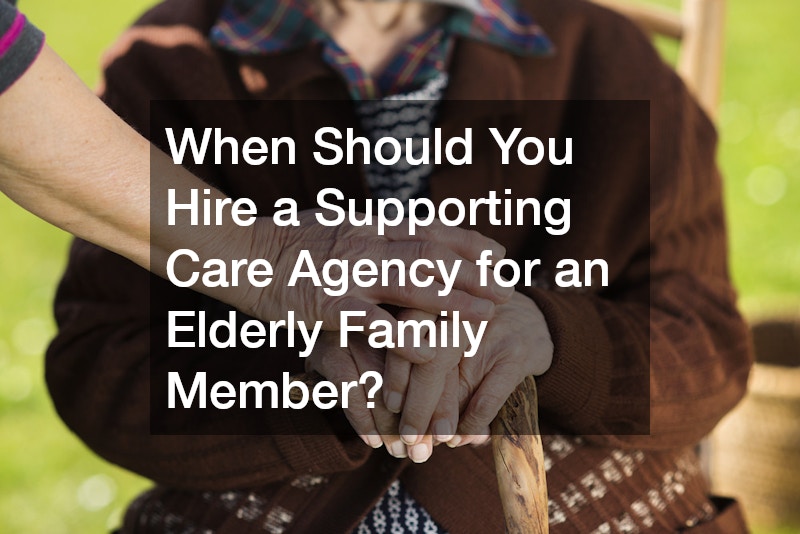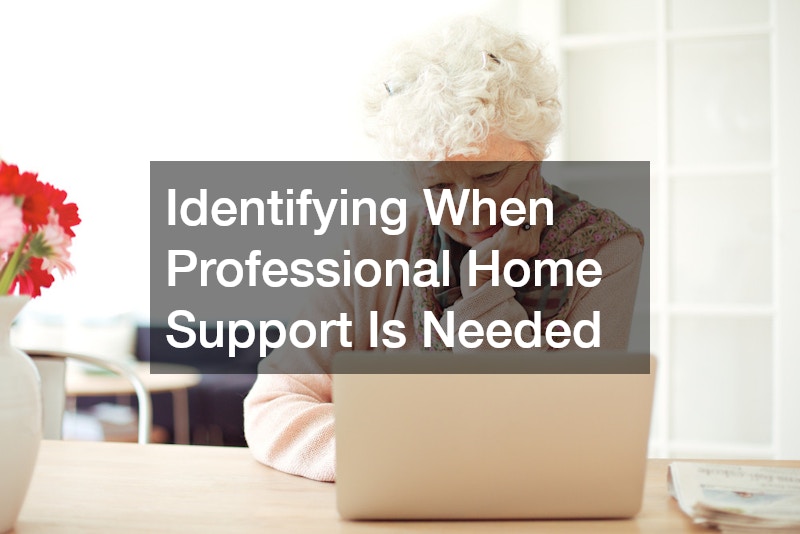Caring for an elderly family member can be one of the most meaningful responsibilities a person can take on, but it can also be overwhelming without the right support. As loved ones age, their physical, emotional, and medical needs often change, requiring more attention and specialized care. Many families initially try to manage everything on their own, but over time, it can become clear that additional help may be necessary. Recognizing when to bring in professional assistance can ensure your loved one receives the best care possible while protecting your own well-being.
A supporting care agency can provide valuable services that help bridge the gap between what families can do on their own and what their loved ones need to thrive. Whether it’s assistance with daily tasks, emotional companionship, or specialized medical support, these agencies offer flexible solutions tailored to each family’s situation. By learning to spot the signs that extra help is needed, families can make informed decisions that prioritize both their loved one’s quality of life and their own peace of mind.
Evaluating Financial and Administrative Challenges in Care
Managing the financial and administrative responsibilities of caring for an elderly family member can quickly become complicated. Between medical bills, insurance claims, and various service providers, families often find themselves navigating a maze of paperwork and expenses. When these tasks start consuming significant time and energy, it may be a sign that professional support is needed. Bringing in a supporting care agency can ease some of these burdens, allowing families to focus more on their loved one’s emotional and physical well-being rather than getting lost in the details.
Partnering with healthcare medical billing companies can help families handle complex billing processes more efficiently. These services ensure that claims are filed accurately, insurance reimbursements are tracked, and unexpected expenses are minimized. For many families, outsourcing these administrative responsibilities provides both financial clarity and relief from stressful tasks. When managing the financial side of caregiving starts to feel overwhelming, this can be one of the earliest indicators that professional assistance may be beneficial.
Noticing Daily Tasks Becoming Increasingly Difficult
One of the most common signs that extra help may be needed is when an elderly loved one begins to struggle with daily activities. Tasks like bathing, dressing, cooking, and cleaning can become physically challenging over time, and family members may not always be available to help consistently. If these difficulties start affecting your loved one’s quality of life or safety, it may be time to consider working with a supporting care agency to ensure they receive reliable assistance.
Hiring a home health aide can make a significant difference in these situations. A trained aide can help with personal care, light housekeeping, meal preparation, and mobility support, ensuring that daily routines are maintained safely and comfortably. This type of assistance can help elderly individuals remain independent in their own homes for longer while giving family members peace of mind. Recognizing the early signs of difficulty with daily tasks allows families to bring in the right level of support before problems escalate.
Identifying When Professional Home Support Is Needed
As an elderly loved one’s care needs increase, families often reach a point where their ability to manage everything themselves becomes limited. Mobility challenges, medication schedules, and the need for specialized medical attention can create a level of complexity that is difficult to handle without assistance. When these responsibilities start to interfere with work, personal time, or the caregiver’s own health, it may be the right moment to consider additional support. A supporting care agency can step in to provide structured help and ensure that your loved one’s needs are met consistently and professionally.
Working with an in home health care company can provide the trained personnel and flexible services needed to address these growing care requirements. These professionals can assist with personal hygiene, medication management, therapy exercises, and even medical supervision when necessary. Their involvement can help prevent accidents, reduce hospital visits, and allow seniors to remain in their own homes safely for longer. Recognizing when professional help is needed is an important step in making sure both the caregiver and the elderly family member receive the proper support.
Recognizing the Importance of Emotional and Social Support
While medical and physical needs are often the primary focus of elder care, emotional well-being is equally important. Seniors who live alone or spend extended periods without social interaction are more vulnerable to loneliness, depression, and cognitive decline. Family members may provide companionship when they can, but busy schedules and distance often make it difficult to offer consistent support. Partnering with a supporting care agency can ensure that your loved one receives meaningful human connection alongside their daily care.
Companion care services are designed to provide social engagement and emotional support to seniors. Caregivers can spend time talking, playing games, going for walks, or accompanying them to appointments and social activities. This kind of interaction helps prevent feelings of isolation and can significantly improve mental and emotional health. By recognizing the importance of companionship early on, families can create a more holistic care plan that addresses both the practical and emotional needs of their elderly loved one.
Addressing Changes in Emotional or Cognitive Well-Being
Changes in mood, memory, or cognitive abilities can be subtle at first, but they are often important indicators that additional care may be necessary. Seniors may become more withdrawn, forget important tasks, or show signs of anxiety or confusion. These shifts can be emotionally challenging for families to manage alone, especially when they’re unsure how to respond appropriately. At this stage, involving a supporting care agency can help ensure that your loved one receives professional attention and emotional support tailored to their needs.
Collaborating with mental health counselors can provide valuable insights and guidance when dealing with these changes. These professionals can assess emotional well-being, identify potential mental health concerns, and offer therapy or coping strategies for both the senior and their family members. Early intervention can help slow cognitive decline, manage emotional challenges, and provide a supportive structure that benefits everyone involved. Recognizing and addressing these signs promptly can improve quality of life and reduce stress for both the caregiver and the elderly family member.
Exploring Alternative Living Arrangements for Safety and Comfort
There may come a time when living at home is no longer the safest or most practical option for an elderly family member. As mobility decreases or medical needs become more complex, the home environment may not be able to accommodate these changes effectively. Falls, isolation, or difficulty managing daily routines can all be signs that a new living arrangement should be considered. Working with a supporting care agency during this stage can help families explore suitable options and make informed decisions that prioritize both safety and comfort.
Assisted living communities provide structured environments designed to support seniors with varying levels of independence. These communities often offer meal services, housekeeping, medical support, and social activities, making them a good fit for individuals who need more help than can be provided at home but don’t require full-time nursing care. Touring communities, speaking with staff, and reviewing the available amenities can help families find the right match for their loved one’s lifestyle and needs. Making this transition thoughtfully ensures continued well-being while easing the caregiving burden on family members.
Understanding Legal and Financial Considerations for Seniors
Caring for an elderly family member often involves navigating a complex web of legal and financial responsibilities. Issues such as wills, powers of attorney, estate planning, and long-term care funding can be overwhelming without professional guidance. Families may not always know when to address these concerns, but handling them early can prevent future complications and stress. A supporting care agency can often refer families to the right experts, ensuring that important decisions are made carefully and in the best interest of the senior.
Consulting professionals who specialize in elder law can help families address these critical areas. These legal experts can assist with drafting essential documents, setting up trusts, planning for Medicaid or Medicare, and ensuring that seniors’ rights are protected. Early legal planning can make transitions smoother, reduce financial uncertainty, and give everyone involved greater peace of mind. Taking care of these considerations alongside care planning helps create a well-rounded support system for elderly loved ones.
Determining When Full-Service Support Is the Best Option
As care needs grow more complex, families may reach a point where piecemeal solutions are no longer sufficient. Coordinating multiple services, managing schedules, and keeping track of medical and emotional needs can become overwhelming. At this stage, it’s important to step back and assess whether a more comprehensive level of care is needed. Turning to a supporting care agency that offers full-service options can relieve the family of many responsibilities while ensuring that the senior receives consistent, high-quality care.
Partnering with an elder care company can provide a wide range of coordinated services under one umbrella. These organizations often handle everything from personal care and companionship to medical coordination and legal guidance referrals. Having a single, trusted team manage different aspects of care streamlines communication and ensures that no important details are overlooked. This approach can dramatically reduce caregiver stress while improving the overall quality of life for the elderly family member. Recognizing when to make this shift is a crucial step in long-term care planning.
Using Technology to Improve Care Coordination
Modern technology has made it easier than ever to manage and coordinate elder care, even when multiple family members or caregivers are involved. Digital tools can help track appointments, monitor health data, and share important updates in real time, ensuring that everyone is informed and on the same page. For families juggling busy schedules or living in different locations, these tools can be invaluable. Integrating technology alongside the services of a supporting care agency can lead to more efficient, organized, and responsive care.
Implementing healthcare software can streamline communication and make caregiving more manageable. These platforms often include features like medication reminders, digital health records, secure messaging between caregivers, and scheduling tools. By using technology to centralize information, families reduce the chances of miscommunication and improve overall coordination. For elderly loved ones with complex medical or daily needs, this combination of human support and digital organization can create a stronger, more reliable care system.
Ensuring Consistent and Comprehensive Medical Support
As seniors age, their medical needs often become more frequent and complex. From managing chronic conditions to ensuring timely medication and appointments, keeping up with healthcare responsibilities can quickly become overwhelming for families. At some point, relying on professional medical support becomes not just beneficial but essential. A supporting care agency can help families identify when this transition is necessary and connect them with the right level of care.
Access to professional medical care ensures that seniors receive consistent monitoring and treatment from trained professionals. This can include services like home visits from nurses, specialized therapy, or transportation to medical appointments. Professional oversight helps prevent health complications, reduces hospital visits, and provides peace of mind for both the senior and their family. By prioritizing comprehensive medical support, families can ensure their loved one receives the quality care they need as their health evolves.
Deciding when to bring in additional help for an elderly family member is never easy, but it is one of the most important choices a family can make. Recognizing the signs that your loved one needs more support—whether it’s daily assistance, medical care, or emotional companionship—can help prevent burnout for caregivers and ensure a higher quality of life for the senior. A supporting care agency can play a vital role in bridging gaps in care and providing specialized services that families may not be able to manage alone.
From evaluating financial responsibilities and addressing legal concerns to ensuring medical consistency and improving emotional well-being, each step in this process is part of a thoughtful, holistic approach to elder care. Utilizing technology, exploring alternative living arrangements, and partnering with trusted professionals can help families make informed, compassionate decisions. These actions not only support the senior’s independence and dignity but also give families the reassurance that their loved one’s needs are being fully met.
Ultimately, knowing when to hire additional help is about recognizing your family’s limits and prioritizing the well-being of your elderly loved one. Whether the support comes in the form of companion services, home health aides, or comprehensive medical care, the right agency can make all the difference. By acting early and thoughtfully, families can create a sustainable care plan that benefits everyone involved—ensuring safety, comfort, and dignity for their loved one while preserving their own peace of mind.







